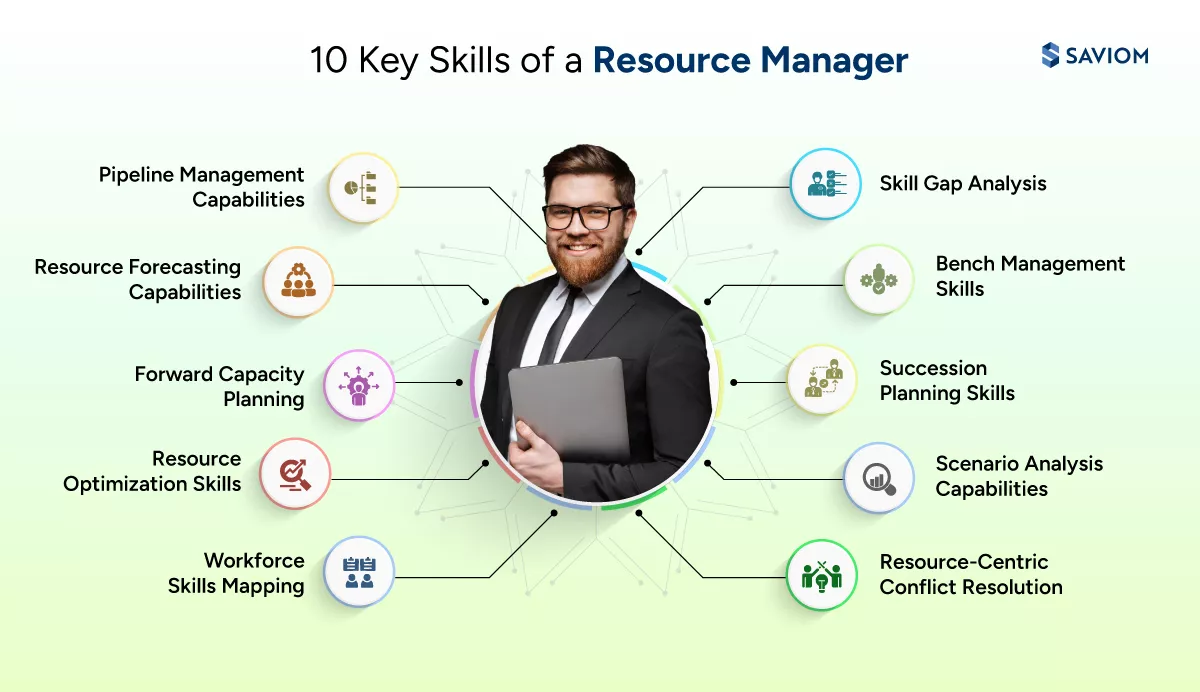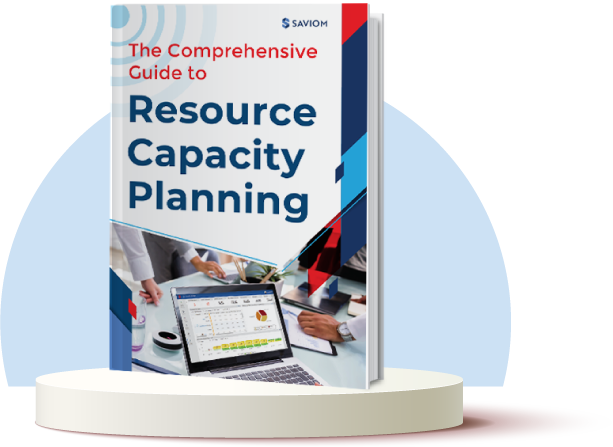Over the decades, the role of a resource manager has evolved from a mere function to a critical necessity. Irrespective of industry, resource managers play a crucial role in ensuring that organizational talent is allocated and utilized optimally across all functional areas.
Their responsibilities extend far beyond basic scheduling. They must possess critical skills such as resource forecasting, capacity planning, resource optimization, workforce skill mapping, and more to streamline critical resource-centric functions.
Furthermore, by acquiring in-depth proficiency in these capabilities, resource managers can effectively align workforce demands with overarching business objectives. This helps ensure operational efficiency, boost profitability, and promote sustainable growth.
In this blog, we’ll explore what is a resource manager, along with their key roles and responsibilities.
Let’s begin.
Who is a Resource Manager?
A resource manager is a professional who is responsible for planning, forecasting, allocating, and managing all business resources (human and non-human) within their span of control. They coordinate with project managers, HR teams, and department heads to ensure that the requisite resources are available for projects at the right time and cost.
Besides, they are responsible for monitoring and improving billable utilization, bridging skill gaps, ensuring bench management, and creating a fulfillment plan for open positions. For a large organization, the average number of resources under a resource manager’s span of control can vary from 200 to 500.
Now, let us focus on understanding the basic prerequisites to becoming a resource manager.
Requirements To Become a Resource Manager
A resource manager typically must possess a combination of both educational and practical knowledge to be effective and efficient in their role. Here are some essential academic and professional requirements:
Education
As per a study by Zippia, “64% of resource managers have a bachelor’s degree, making it a common educational qualification among them.”
At a minimum, resource managers must hold a bachelor’s degree. They must seek specialization in subjects such as resource management, project management, or labor relations to succeed in the field of resource management. The most common degrees that RM pursue include:
- Business administration
- Human resource
- Communications
- Psychology
- Operations management
Although not necessary, having a master’s degree in these domains can help resource managers secure senior positions and better compensation.
Certifications
Apart from basic qualifications, additional certifications and credentials can greatly enhance an RM’s credibility and skillset, making them more effective in their role. The most common certifications include:
- Resource Management Certified Professional (RMCP)
- Certified Resource Planning Professional (CRPP)
- Professional in Human Resources (PHR)
- Certified Scrum Master (CSM)
- Six Sigma Certifications
Further, when employees bring recognized credentials to the table, their chances of getting promotions, senior-level roles, or more diverse job opportunities become higher.
Work Experience
Gaining the right experience is the key to becoming proficient. Therefore, one must pursue entry-level jobs to obtain practical, real-world insights and skills that are not easily gained through education alone. The common entry-level jobs are:
- Coordinators
- Project analysts
- Data analysts
- Consultants
The experience gained from these roles can help interested professionals to become resource managers later in their careers.
People Skills
Beyond industry qualifications, a resource manager should possess strong interpersonal or people skills. These skills are essential for effective communication, resolving resource-centric conflicts, fostering collaboration, and maintaining team harmony. A few relevant people skills that any resource manager must have are:
- Communication
- Conflict Resolution
- Negotiation
- Adaptability
As a key point of contact between various business units and stakeholders, a resource manager relies on these skills to ensure a smooth and efficient resource management workflow.
Having understood what is a resource manager and the requirements for the position, let us explore some of their key responsibilities within an organization.
Resource Manager Responsibilities and Functions
A resource manager needs to fulfill certain vital responsibilities to keep the organization running smoothly. Here’s a rundown of their essential responsibilities.
Helps Project Managers with Capacity Planning for Pipeline Projects
A resource manager must coordinate with the project manager to stay abreast of future resource requirements for pipeline projects. They first foresee the resource demand and assess the available capacity to find any existing gap between them. Then, they can proactively implement appropriate resourcing treatments to bridge the gap.
For instance, if there is a shortage, RM can allocate people on the bench, implement the out-rotation and backfill strategy, or go for planned hiring to proactively fill the project vacancies. Conversely, if there is excess capacity, the RM can request the project manager to bring timelines forward or sell the expertise at discounted rates.
Read More: 5 Best Practices for Capacity Management
Assign Resources to Projects as Per Competencies and Skills
Every project requires a set of different skills, and misalignment in these resource competencies and demands can impact its quality or timeline. For instance, assigning a critical or niche-skilled resource to a routine, mundane task can lower their engagement and escalate project budgets. On the contrary, allocating an under-skilled resource to skill-intensive tasks hampers the project’s progress and quality.
Thus, the vital role of a resource manager is to diligently assess each project’s resource requirements and understand the skills and competencies needed. Then, based on resource availability, allocations are made, ensuring that they align with the attributes of resources, thus eliminating future project bottlenecks.
Tracks Resource Utilization and Employee Performance
The onus lies on the RM to maintain the resource health index. Therefore, they must track utilization levels in real time to ensure every resource works on billable or strategic projects. Another job under their purview is evaluating the workload and distributing it uniformly among all resources to prevent over/underutilization.
If resources are overutilized, RMs can pull in more resources to redistribute the work, make utilization levels uniform, and prevent employee burnout. For underutilized resources, finding some billable or strategic work to assign them to can help enhance everyone’s productivity.
Read More: How to Track Resource Utilization?
Collaborates Within Departments for Resource Requirements
Although resource management is an independent discipline, it requires coordination between resource managers and other leaders or supervisors of the organization. For instance, to understand the project’s criticality and requirements, an RM must collaborate with project managers or the PMO. Otherwise, it will become arduous for them to find the ideal fit for the job.
Furthermore, collaborating enables them to manage dependencies efficiently by creating a comprehensive resource plan and adjusting it to avoid conflicts or delays. Finally, to bridge skill gaps or resource crunch, they must coordinate with HR managers to streamline the recruitment process and implement tailored training and development programs.
Creates Learning and Development Roadmaps for Resources
“Gartner’s recent research reveals that 58% of the global workforce needs new skills to get their jobs done.”
This stat highlights the value of constant training and upskilling of resources in retaining a competitive edge and high productivity. Thus, a resource manager has to stay updated with evolving industry and technology trends and skill demands. It is also vital for them to take resources’ interests and aspirations into account.
Accordingly, they must identify skill gaps and formulate a personalized learning and development program to future-proof their workforce. This way, they avoid frequent hiring/firing cycles, save resource costs, and boost employee engagement.
Read more: How Can Retraining/Upskilling Future-Proof Your Workforce?
Effectively Manage Bench & Implement Corrective Measures
Bench refers to employees who are not allocated to any client or strategic project, which means they are non-billable but on a company’s payroll. An RM needs to constantly track bench size using a resource management tool to ensure it doesn’t exceed the threshold. For that, they must foresee project ramp-downs and find suitable project vacancies to allocate employees before they hit the bench.
Besides, they should also implement appropriate resourcing treatments such as training or upskilling for the benched resources to utilize them effectively. Additionally, providing shadowing opportunities to engage freshers and assigning senior employees to strategic work or training juniors falls under the radar of resource managers’ responsibilities.
Develop Appropriate Resource Risk Mitigation Plans
Creating relevant resource risk mitigation plans is a key responsibility of a resource manager to minimize disruptions that may arise from workforce-related challenges. This involves identifying risks such as resource shortages, skill gaps, double booking, over/underutilization, or resource dependencies that could impact project timelines and deliverables.
The RM must then devise appropriate contingency plans, such as cross-training, workforce optimization techniques, or creating a buffer of resources to mitigate these risks. By proactively managing these challenges, the resource manager helps ensure that projects remain on track and are completed efficiently, even in the face of unforeseen circumstances.
Now, let us explore the essential skills required by an RM in an organization.
Read More: How to Mitigate Resource Risk in Project Management?
10 Key Skills Required to be a Resource Manager
Resource managers need to be equipped with essential management skills to perform their duties effectively. Let’s look at some of them:
Pipeline Management Capabilities
One of a resource manager’s key skills is their ability to track upcoming pipeline projects to plan future resource requirements. This way, they can ensure that the right people with the right skills are available at the right time and cost, enabling timely project initiation. Moreover, this capability gives them enough lead time to take corrective measures like training, upskilling, or engaging in planned hiring to avoid last-minute firefighting and subsequent cost escalations.
Resource Forecasting Capabilities
As per a 2024 survey by Resource Management Insititute, “forecasting is still the biggest inhibitor to effective resource management.”
The above stat reaffirms that Resource forecasting is one of the most critical skills that resource managers must possess. They must apply advanced techniques like time series analysis, the Delphi method, expert panels, etc., to determine workforce demand trends. Further, they can anticipate skill gaps early, gather strategic input from experts, and ensure the timely availability of resources within the predetermined budget.
Forward Capacity Planning
Forward capacity planning is another essential skill that helps resource managers anticipate workforce shortages or excesses across projects. This allows them to formulate resourcing strategies like training/upskilling, out-rotation, backfill hiring, bringing forward the project timelines, etc., to bridge the gap in advance. Thus, managers can prevent last-minute expensive hirings and ensure successful project delivery.
Read More: How to Measure Resource Capacity and Demand
Resource Optimization Skills
This skill enables resource managers to utilize their talent pool to the maximum potential to meet unique project and business goals. By applying suitable techniques like resource leveling and smoothing, resource managers can adjust project start or end dates, optimize the workloads, or pull in extra resources without altering the critical path. This helps boost employee productivity, improve operational efficiency, and enhance ROI.
Workforce Skills Mapping
The above-mentioned skill allows resource managers to track, record, and update available employee competencies in a centralized database. This helps them stay alert of expiring certifications or emerging skill shortages and take course-corrective actions ahead of the curve. This could include encouraging employees to renew certifications or providing targeted skill development opportunities to build an optimized talent pool.
Skill Gap Analysis
Skill gap analysis is a critical competency that allows resource managers to determine current workforce competencies, identify areas for improvement, and take focused action to bridge them. Further, this foresight helps them stay aligned with industry trends and enhance the capabilities of the talent pool, ensuring the team is fully equipped to take on future demands with confidence.
Read More: Top 24 People Skills Every Professional Needs to be Successful
Bench Management Skills
This expertise allows resource managers to manage the bench efficiently and reduce revenue losses. It enables them to anticipate upcoming project ramp-downs, quickly reassign resources to internal projects, training, or short-term assignments, maximize their billability, and reduce bench time effectively. This helps organizations improve their resource utilization and boost business profitability.
Succession Planning Skills
According to SHRM Survey 2024, “56% of the respondents report a lack of a proper succession plan in their firm.”
A resource manager must be proficient in succession planning to ensure seamless role transition, business continuity, and a future-ready workforce. They must play a critical role in identifying emerging talent and grooming them for future leadership roles. Further, by establishing structured career paths for key personnel, firms can reduce the chances of unplanned attrition, preserve institutional knowledge, and maintain sustainable growth.
Scenario Analysis Capabilities
Resource managers must excel in scenario analysis, which enables them to strategically model and simulate multiple scenarios in a sandbox environment within existing resource-centric constraints. This includes strained budgets, hiring delays, unanticipated demand spikes, etc. Accordingly, they can compare these multiple feasible futures, prevent resourcing bottlenecks, and choose the best possible resource plan.
Resource-Centric Conflict Resolution
A resource manager must be adept at navigating conflicts among multiple stakeholders, especially when dealing with competing resource demands. As skilled negotiators, they are expected to remain neutral and fair while settling disputes between project managers over critical resources. Moreover, in cases of resource-related conflict with the client, the project manager can rely on the resource manager to engage and persuade the stakeholders to reach an amicable resolution.
Read More: How to Ensure Effective Conflict Resolution in a Hybrid Office?

Now, let’s see how the role of a resource manager is different from other management positions.
Resource Manager vs. Other Management Roles
While the RM role revolves around allocating and utilizing resources, other management roles like project management, HR, and operations involve broader responsibilities that intersect with the organizational goals. Thus, it is essential to understand these distinctions and how they work within an organizational setting.
Resource Manager vs. Project Manager
Resource managers and project managers play crucial roles in completing a project. The former assures that the project avails the right resources at the right time while ensuring optimal resource utilization. On the other hand, the role of project manager is to ensure projects are delivered within the time and budget constraints by utilizing the available resources.
Here is a comparison:
| ASPECT | RESOURCE MANAGER | PROJECT MANAGER |
|---|---|---|
| Primary Focus | Manages employees and other resources across multiple projects within their span of control | Manages projects-related activities, including initiation, execution, and delivery |
| Key Responsibilities | Performs forecasting & capacity planning, allocates resources, facilitates bench management, and ensures optimal utilization | Defines project scope, understands requirements, and estimates timelines & budgets |
| Goals | Facilitates allocation of the right resources to tasks while ensuring employee satisfaction and engagement | Guides resources to deliver high-quality projects within time & budget constraints and boosts client satisfaction |
| Key Skills | Common skills include strategic planning, analytical & problem-solving, negotiation, communication, and risk management | Essential skills are leadership, time management, communication, domain knowledge, stakeholder management, and risk management |
| Primary Metrics | Establishes KPIs to measure resource availability, capacity vs. demand, and utilization rates | Monitors project performance using milestones and deadlines achieved, cost, and quality metrics |
| Reports To | Often reports to operations or human resource departments | Often reports to clients or senior management |
| Challenges addressed | Addresses skill gaps, talent shortages, resource conflicts, and over/under allocations | Identifies and addresses project risks such as scoop creep, budget constraints, schedule overruns, etc. |
Resource Manager vs. HR Manager
Although both resource and HR managers strive to work towards maximum efficiency and achieve business goals, their path differs. RM deals with forecasting, planning, allocating, and utilizing resources. However, HR managers ensure that while RM does that, no labor laws are broken and that resources are happy.
Here is a comparison:
| ASPECT | RESOURCE MANAGER | HR MANAGER |
|---|---|---|
| Scope of Work | Manages every resource (people, equipment, etc.) across various projects | Manages recruitment, employee relations, and organizational culture |
| Primary Responsibilities | Oversees resource allocations, monitors availability & utilization, and collaborates to fulfill resource requirements | Oversees recruitment and training, carries out employee performance management, adheres to compliance, and maintains employee relations |
| Objectives | Ensures skill availability and facilitates competent resource allocations for maximum productivity and efficiency | Ensures positive employee experience and workplace culture, increases employee retention, and resolves conflicts |
| Key Skills | Primary skills include resource management, problem-solving, negotiation, leadership, communication, and technology proficiency | Key skills include communication, negotiation, compliance & legal knowledge, crisis management, and emotional intelligence |
| Major Indicators | Monitors key performance indicators like resource utilization rates, capacity vs. demand, availability, etc | Important KPIs include employee turnover rates, cost per hire, and performance appraisal score |
| Reporting Structure | Reports to senior management on resource management | Reports to senior executives in the HR department |
| Challenges addressed | Resolves issues such as resource shortages, skill gaps, scheduling conflicts, and sub-optimal utilization | Addresses issues such as employee grievances, compliance risks, and turnover |
Let’s now look at the signs that indicate the urgent need for a resource manager.
Read More: Resource Manager vs. HR Manager: What Are Their Roles & Responsibilities?
Signs That You Should Invest in a Resource Manager
In a fast-paced project environment, the absence of a resource manager can lead to significant challenges. Here are some key signs that indicate it’s time to consider investing in this crucial role:
Hiring Delays and Mismatched Talent
When an organization consistently faces frequent hiring delays and a lack of alignment between available talent and project needs, these are clear signs that it’s time to invest in a resource manager. Without effective resource management, organizations may struggle to fill critical roles or hire candidates lacking the necessary skills. These mismatches lead to reduced productivity, missed deadlines, and increased turnover as employees disengage from roles that don’t align with their expertise.
Consistent Overload and Team Burnout
When team members are constantly overloaded with tasks, leading to high stress and burnout, it’s a sign that a resource manager could greatly benefit your organization. Without a balanced workload distribution, some employees may be overworked while others are underutilized, leading to burnout and increased attrition risk. These issues signal the need to hire a resource manager who can track and optimize team utilization levels and maintain productivity.
Frequent Resource Shortages
If your projects regularly face delays due to a lack of available resources, it’s a strong indication that investing in a resource manager could transform your operations. Frequent resource shortages often result from inadequate forecasting, poor resource planning, or a lack of visibility into current and future project demands. These shortages can disrupt timelines, increase project costs, and create a reactive approach to resourcing where last-minute fixes replace strategic planning.
High Disengagement & Low-Morale
When skilled employees are repeatedly assigned to administrative tasks while junior staff handle high-priority projects, it can lead to disengagement, low morale, and frequent absenteeism. If this unbalanced workload becomes a pattern, investing in a resource manager can help. By aligning resources to projects based on skills and interests, a resource manager keeps teams engaged and motivated, boosting productivity and retention.
Skill Gaps in the Team
Persistent skill gaps within the team can hinder project success and lead to delays or quality issues. Without a resource manager to assess team capabilities and match them to project needs, these gaps often go unnoticed until they impact deliverables. A resource manager proactively identifies skill deficiencies, enabling targeted training or strategic hiring to fill these gaps in advance. This approach ensures projects have the right skills on hand, improving productivity and overall outcomes.
Read More: Six Reasons Why Businesses Need To Invest in Resource Managers
What are Resource Manager KPI’s?
A resource manager’s performance depends on how efficiently they meet their key performance indicators (KPIs).
The following are the primary KPIs to fulfill for a project resource manager.
Billable Utilization
Billable utilization of every resource falling under an RM’s span of control is one of the main KPIs. The percentage of the resources’ available capacity utilized for billable and strategic work determines their performance.
Bench Size
Bench size keeps increasing or decreasing according to constantly changing resource demands. A good resource manager must keep the bench size within a fixed percentage of the available capacity or minimize it.
Bench Aging
The number of days a resource is on the bench is called bench aging. Ideally, the bench aging should be 0 days. However, in practical scenarios, it should not exceed 90 days. If it exceeds, it indicates an issue with the manager’s performance.
Fill Rate
The fill rate is measured to determine how efficiently a resource manager can fulfill the resource demand on or before the project begins. If a resource manager assigns the resource as per the demand on or before the start date, the fill rate is considered 100%.
Individual Development Program (IDP)
Every employee has their personal development goals and aspirations regarding their career. It is, therefore, vital for a manager to cater to the needs of the employees and give them enough opportunities to hone soft skills and other technical skills in their respective domains.
Final Thoughts
As resources are the key investments of a firm, tapping into their maximum potential is highly important. That’s why resource managers are an integral part of determining project and organizational success.
The primary objective of an RM is to increase an enterprise’s profitability and sustainability by maximizing the potential of the workforce. Therefore, one can become efficient in this profession by understanding the key responsibility areas and refining the above-discussed resource management skills.
The Glossary
Read More: Glossary of Resource Workforce Planning, Scheduling and Management











Leave a Reply